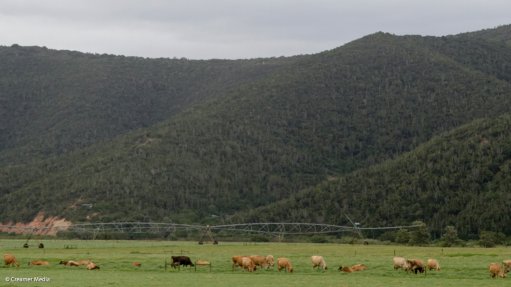
Photo by: Duane Daws
South Africa is facing a land reform dilemma, with the redistribution of land having progressed well below expectations and with much of the land already transferred falling into an economic abyss.
Of the estimated 5.9-million hectares of functional farms that had been transferred, up to 90% have lost productivity and productive use, and even fallen into neglect, resulting in a loss of many jobs and risking food security.
“Now, 5.9-million hectares is about one-and-a-half times the size of Switzerland, so that really demonstrates the extent of the challenge,” said nonprofit organisation Vumelana Advisory Fund CEO Peter Setou.
Speaking on day two of the Agribusiness Africa conference, held in Kempton Park, on Wednesday, he said the transfers increased to 6.7-million hectares by 2012 and, more recently, up to between eight-million to nine-million hectares, with the failure rate said to be reduced to 70%.
The restitution of land without access to capital, markets and skills is detrimental not only to the communities surrounding the farms, but also the economy and food security for a growing population.
New land owners fail to reap the benefits from the land they acquire, as they struggle to raise the capital or acquire the skills needed to work the land productively.
In addition, a significant part of the funding available for the acquisition of land is used to recapitalise projects that have failed.
This resulted in a need to change the pattern of land ownership, with the beneficiaries of transferred land better enabled to make their land productive.
“Participation and support is actually required through the process – before, during and post the transaction,” Setou pointed out, noting that the private sector has a significant role to play in mitigating these issues.
The most immediate solution to the challenge, he said, was in the form of specific partnership structures with those with private capital resources and access to financial and other markets, leading to collaboration with operators and advisers, the joint mobilisation of investment and community involvement.
“If resources are to be mobilised and sustainable benefits are to result for land reform beneficiaries, then private capital must be brought into the process and new land owners must be enabled to become competitive market participants,” Setou commented.
Vumelana aims to act as a link between investors and communities to minimise the rate of failure and reduce private sector investment risk by funding advisory services to structure commercially viable partnerships.
“Vumelana aims to demonstrate the value of markets and partnerships as a means of increasing access to land that can be used productively, improving land tenure, and providing linkages to finance, skills and networks needed to make effective use of land,” the company said of its mandate.